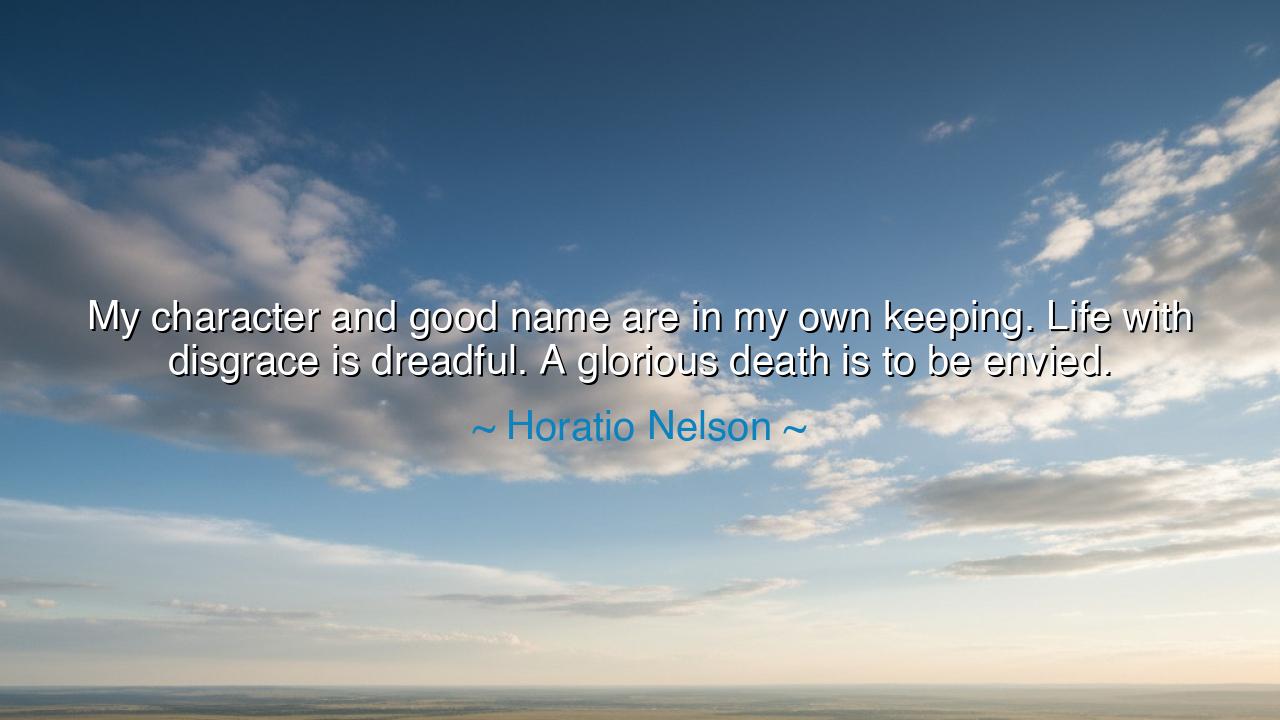
My character and good name are in my own keeping. Life with
My character and good name are in my own keeping. Life with disgrace is dreadful. A glorious death is to be envied.






“My character and good name are in my own keeping. Life with disgrace is dreadful. A glorious death is to be envied.” Thus spoke Horatio Nelson, the lion-hearted admiral of the seas, whose courage burned as fiercely as the cannons of his fleet. These words, uttered by a man who knew the scent of battle and the nearness of death, are not the boast of pride, but the creed of honor. They speak to the eternal truth that character is the one possession no fate can strip away, and that honor, once lost, leaves life hollow. In this declaration, Nelson offers not merely a soldier’s code, but a philosophy of the soul—one that binds glory not to victory, but to virtue.
Born in the age of empire and tempest, Nelson rose from frail beginnings to command the oceans. His body was scarred, his vision dimmed, yet his spirit shone unbroken. He carried within him the conviction that integrity—that invisible fortress within a man—is worth more than all the gold or crowns the world could bestow. For Nelson, to live without honor was to live in darkness, and to die in the light of duty was to achieve immortality. His words are not of despair, but of defiance: that disgrace, not death, is the true enemy of the noble heart.
The power of this quote lies in its understanding of what it means to own oneself. “My character and good name are in my own keeping,” Nelson says—declaring that reputation, though shaped by others’ tongues, is guarded only by one’s own conduct. The ancients knew this wisdom well. Marcus Aurelius, emperor and philosopher, wrote that a man’s worth is measured not by what others say, but by what he does when unseen. To Nelson, as to the Stoics, virtue is self-governance—the mastery of one’s choices, one’s word, one’s heart. He knew that fortune could take his life, but only he could surrender his integrity.
In this belief, Nelson lived and died. At the Battle of Trafalgar in 1805, facing a fleet larger and more fearsome than his own, he refused retreat. His last order, the signal that still echoes across centuries, was simple and immortal: “England expects that every man will do his duty.” As the battle raged and victory drew near, a musket ball struck him down. Dying on the deck of his ship, he whispered, “Thank God, I have done my duty.” His body perished, but his name became legend—proof that a glorious death in honor outweighs a thousand cowardly lives.
And yet, let none mistake Nelson’s words for a thirst for death. His meaning is not the blind worship of battle, but the reverence for dignity. To live in dishonor, to betray one’s principles, to act without courage—this is the death that begins before the grave. But to live steadfast, to uphold truth even in peril, is to walk already among the immortal. Nelson’s glory was not that he died in war, but that he lived by conviction. His glorious death was but the natural end of a glorious life—a life governed by duty, humility, and the guardianship of his name.
Through his words, we are reminded that character is destiny. Titles fade, monuments crumble, but a good name endures. The man who keeps his honor intact walks unafraid through any storm, for his conscience is his compass. Even in defeat, he remains unconquered, for disgrace cannot touch him who acts with truth. Nelson’s creed is thus not only for warriors, but for every soul who must choose between ease and integrity, between the comfort of silence and the courage of virtue.
So, O seeker of wisdom, remember this: your character and good name are treasures only you can guard. Do not barter them for approval, nor tarnish them with deceit. Let your actions shine so brightly that even death cannot dim their light. Live in such a way that, if fate calls you to hardship or sacrifice, you may face it unflinching, saying, “I have done my duty.” For life with disgrace is indeed dreadful—but to live with honor, even unto death, is to touch eternity.
And thus, in the spirit of Horatio Nelson, carry this truth within you: that courage is not the absence of fear, but the triumph of conscience over comfort. Let your name be spoken with respect, not because of your victories, but because of your virtue. Then, whether in life or in death, you shall be truly glorious—for the light of integrity burns brighter than the stars.






AAdministratorAdministrator
Welcome, honored guests. Please leave a comment, we will respond soon